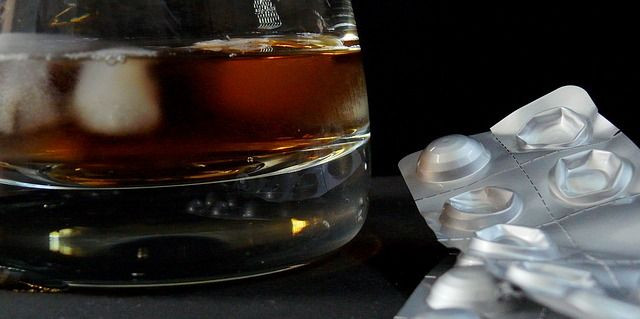Drinking Alcohol While Taking Antidepressants Could Exacerbate Depression, Increase Drug's Side Effects

Whether you drink to cap off a taxing work day or to loosen up before or during a social event, many people enjoy the relaxing qualities of alcohol — it is a depressant after all. Due to alcohol’s “downer” qualities, people taking antidepressants should be cautious of the potential health effects that may result from mixing alcohol with these drugs.
Depression is a serious medical illness marked by mental anguish and physical ailments that often interfere with normal daily function. This debilitating illness is a public health concern that affects more than one out of 20 Americans aged 12 years and older, according to the Centers for Disease Control and Prevention . Many people suffering from depression are prescribed selective serotonin reuptake inhibitors (SSRIs), one of the most commonly prescribed class of antidepressants. Some of these household name drugs are Celexa, Lexapro, Luvox, Paxil, Prozac, and Zoloft.
Although the effects alcohol can have on those taking antidepressants are not well-known, many experts and manufacturers of these drugs warn against mixing the two since “alcohol intoxication and withdrawal from alcohol can cause a depressive reaction,” FDA spokesperson Kristofer Baumgartner told Medical Daily .
As you can guess from its name, SSRIs primarily target serotonin, a neurotransmitter primarily found in the central nervous system that is responsible for maintaining mood balance. Depression is not fully understood, but studies have linked low serotonin levels to depression. SSRIs work by hindering the reabsorption of serotonin back into the nerve cells they came from -- these type of neurotransmitters are usually repackaged and stored until they are needed again — leading to an increase in serotonin levels. Scientists believe this uptick in serotonin levels would lead to an improvement in communication between nerve cells, strengthening circuits in the brain which regulate mood.
The consumption of alcohol can also lead to a boost of serotonin, but only temporarily. During this time, people on antidepressants are at risk of having too much serotonin in the brain, since antidepressant inhibits reuptake of serotonin. This could cause serotonin syndrome , which includes symptoms like agitation or restlessness, high blood pressure, twitching muscles and diarrhea. A severe form of this condition, which can be life-threatening, includes symptoms such as high fever, seizures, irregular heartbeat and unconsciousness.
However, after a while, chronic alcohol intake can lead to lower serotonin levels, potentially exacerbating the illness.
“Part of the syndrome of chronic alcohol intake is depressive feelings the next day, these alcohol-related depressive symptoms are not generally thought to be helpful for a depressed person, and we have no clinical evidence that antidepressants prevent or lessen this effect of alcohol,” Baumgartner said. “Therefore, the clinical recommendation is to not combine the two (alcohol and depression) or combine the three (alcohol, depression, and antidepressant medications).”
In some cases alcohol could exacerbate its side effects. One study found that the combination of alcohol and antidepressants are most likely to lead to antidepressant related deaths. The same study also mentions that 80 percent of deaths from antidepressant drugs were suicides. This is alarming since suicidal thoughts, as well as violent behavior, mania or aggression, are side effects of antidepressants. It also doesn’t help that alcohol can lower inhibition s, including those one may have about committing suicide or doing something else that’s self-destructive.
Other side effects include fatigue and drowsiness which can become worse when combined with alcohol, since it is already documented that alcoholic beverages can impair judgement and reaction time.
The bottom line is: there are many adverse outcomes that may arise from the mixing of antidepressants and alcohol. However, since most of the potential problems associated with combining the two have not been studied in the setting of alcohol, the blanket recommendation to not use alcohol with antidepressants exists.
“The better way to approach this is to discourage the use of alcohol in depressed patients, on medications or not,” Baumgartner said. “People who are depressed enough to be on medications should not (per the labels) drink alcohol.



























